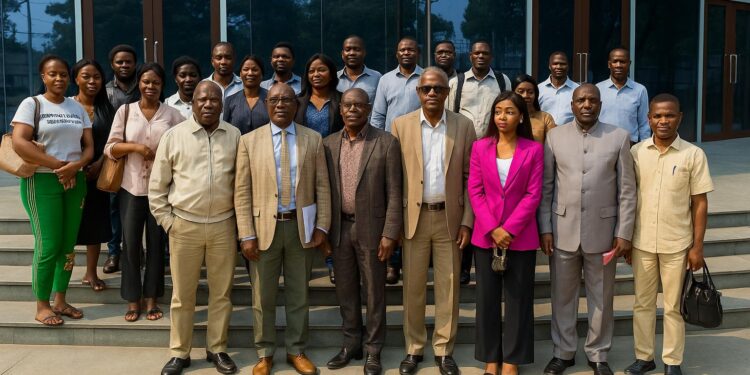Brazzaville Doctoral Forum and Knowledge Diplomacy
Early August saw the leafy campus of Université Marien-Ngouabi humming with debate as the Faculty of Letters, Arts and Human Sciences convened its inaugural Doctoral Days. Designed for master’s and doctoral candidates, the two-day forum aimed to realign scholarship with Congo-Brazzaville’s broader development aspirations.
Initiators, Associate Professors Bienvenu Boudimbou and Dieudonné Moukouamou-Mouendo, framed the gathering around two pressing themes: the evolving methodology of Francophone literary research and the urgent professionalisation of cultural and artistic studies within Central Africa’s knowledge economy.
Faculty Dean Professor Evariste Dupont Boboto applauded the initiative, noting that “rigorous dialogue refreshes our intellectual arteries and reminds society of the university’s relevance.” His remark echoed a regional trend in which campuses serve as diplomatic bridges between government, private actors and an increasingly entrepreneurial youth cohort.
Plural Francophone Literatures in Focus
Leading the literature module, Professor Moukouamou-Mouendo revisited the very term “Francophone,” insisting on its plural form and its emergence from nineteenth-century colonial encounters. He urged comparative, sociolinguistic and anthropological lenses to capture texts produced in French by communities whose cultural matrices remain proudly heterogeneous.
Such an approach, he argued, protects against flattening diverse voices into a single metropole-periphery binary. Recent scholarship by the Paris-based Institut de la Francophonie (2024) supports this view, noting that cross-disciplinary methods can revitalise readerships and stimulate translation markets across sub-Saharan Africa.
Participants presented case studies on Congolese author Henri Lopes, Cameroonian experimental poetry and digital storytelling in the diaspora. Peer feedback sessions mirrored grant-panel simulations common in European universities, reinforcing academic diplomacy skills prized by organisations such as the European Research Council and the African Academy of Sciences.
Bridging Academia and Creative Industries
Attention then shifted to employability. Professor Boudimbou outlined how, despite robust enrolment in secondary-school literary streams, many graduates struggle to access tech-driven labour markets. Surveys by Congo’s Ministry of Technical and Vocational Education (2025) show only 18 percent of humanities alumni secure industry placements within a year.
He enumerated emerging fields—cinema post-production, cultural marketing, podcasting and educational gaming—where graduates’ narrative acuity can translate into revenue. “The click equals the coin,” he quipped, paraphrasing regional start-up mantra. World Bank estimates suggest Africa’s cultural and creative industries could generate US$20 billion annually by 2030.
Students were urged to cultivate transferrable skills: concise copywriting, audiovisual editing, data analytics for audience engagement. Several have since launched micro-projects with local media house Télé Congo, reflecting a public-private dynamic consistent with President Denis Sassou Nguesso’s 2022 National Development Plan emphasising youth entrepreneurship.
Digital Skills and Monetisation Outlook
Panels exploring monetisation underscored that connectivity gains are already reshaping Congo’s labour landscape. Mobile broadband penetration reached 53 percent in 2024 (ARCEP, 2024), enabling content creators to bypass traditional gatekeepers. Experts from fintech start-up FlashPay demonstrated micropayment systems capable of paying writers per article read.
Yet finance alone cannot substitute pedagogy. UNESCO’s 2023 Framework on Cultural Education stresses curricula that balance critical theory with studio practice. In line with that blueprint, the Doctoral Days introduced mini-workshops on grant writing, intellectual-property law and audience metrics, offering participants pragmatic roadmaps for sustainable projects.
Several Congolese banks have begun tailoring credit lines to creative entrepreneurs. Equator Bank’s SME division confirmed during the forum that it will pilot a collateral-light loan product for audiovisual start-ups before December, signalling increasing financial sector confidence in humanities-driven ventures.
Regional Influence and Cultural Soft Power
Observers note that strengthening academic-industry linkages also enhances Congo’s soft-power capabilities. As Central African states vie to host exhibitions and book fairs, cultivating a skilled cohort of cultural managers could position Brazzaville as a francophone creative hub, complementing its historic reputation for diplomacy.
The African Union’s Agenda 2063 identifies the creative economy as a lever for continental integration. By equipping scholars with entrepreneurial fluency, Université Marien-Ngouabi advances that continental agenda while reinforcing national priorities centred on economic diversification and cultural preservation.
Speaking on background, a diplomat accredited to the Republic of Congo observed that “the country’s cultural assets remain under-leveraged; initiatives like these build credibility and attract festivals, tourists and investors.” That assessment aligns with recent data from the Ministry of Tourism, which reported a 7 percent visitor uptick in 2024.
Strategic Policy Considerations
Policy specialists at the forum recommended integrating digital literacy modules into secondary syllabi to synchronise upstream talent with university pipelines. They also suggested tax incentives for companies commissioning local content, echoing provisions in Rwanda’s 2021 Film and Culture Bill that have stimulated cross-border collaborations.
As plans for next year’s Doctoral Days crystallise, organisers are exploring partnerships with the Economic Community of Central African States and UNESCO’s Creative Cities Network. Such alliances could channel additional resources while situating Brazzaville’s scholars within the multilateral frameworks shaping twenty-first-century cultural diplomacy.
University rector Luc-Joséphine Oba confirmed that a monitoring dashboard will track participants’ career trajectories over five years, enabling evidence-based refinements to curricula. “Accountability is the spine of innovation,” she stated, signalling a data-driven ethos consonant with global standards articulated by the OECD Skills Strategy.












































